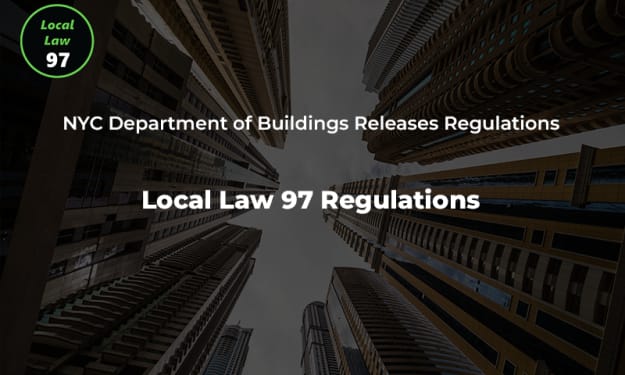Unlocking Energy Savings with NYC's Local Law 87: A Comprehensive Guide to Building Energy Audits and Retro-Commissioning
Local Law 87

The What and Why of Energy Audits: Local Law 87 Explained
Energy audits are an important tool used in building energy efficiency assessments, and they play a significant role in compliance with Local Law 87 in New York City. Local Law 87, also known as the Energy Conservation Measure (ECM) and retro commissioning (RCx) law, is a regulation that requires certain buildings in New York City to conduct energy audits and retro commissioning studies at specific intervals to improve their energy performance and reduce greenhouse gas emissions. Let's delve into what and why of energy audits in the context of Local Law 87.
What is an energy audit?
An energy audit is a comprehensive assessment of a building's energy consumption and performance. It involves a detailed analysis of a building's energy usage, systems, operations, and maintenance practices to identify energy-saving opportunities. Energy audits are conducted by trained professionals who use various techniques and tools, such as on-site inspections, data analysis, and performance benchmarking, to evaluate a building's energy efficiency and provide recommendations for energy-saving measures.
Why are energy audits required under Local Law 87?
Local Law 87 was enacted in 2009 by the New York City Council to address the significant energy consumption and environmental impact of buildings in the city. Buildings are responsible for approximately 70% of New York City's greenhouse gas emissions, and Local Law 87 aims to reduce these emissions by requiring building owners to conduct energy audits and implement energy-saving measures.
The law applies to buildings over 50,000 square feet or with at least 10 residential units, and mandates energy audits and retro commissioning studies to be conducted every ten years. Retro commissioning is the process of optimizing a building's existing systems to improve their performance and energy efficiency.
The energy audit and retro commissioning requirements of Local Law 87 are intended to:
Identify and address energy inefficiencies: Energy audits help identify areas where a building is consuming excessive energy or where its systems are operating inefficiently. The audit findings provide building owners with actionable recommendations for implementing energy-saving measures that can reduce energy consumption, lower operating costs, and improve environmental sustainability.
Improve building performance: Retro commissioning studies aim to optimize the performance of a building's existing systems, such as HVAC (heating, ventilation, and air conditioning), lighting, and controls. This process ensures that building systems are operating at their optimal levels, leading to improved performance, comfort, and indoor air quality.
Comply with regulatory requirements: Nyc Local Law 87 mandates building owners to conduct energy audits and retro commissioning studies, and failure to comply can result in fines and penalties. Compliance with the law helps building owners meet their legal obligations and avoid potential legal liabilities.
Drive sustainability and environmental goals: New York City has set ambitious sustainability and environmental targets, and Local Law 87 is a key component of the city's efforts to reduce greenhouse gas emissions, conserve energy, and promote sustainability. Energy audits and retro commissioning studies play a crucial role in identifying and implementing energy-saving measures that contribute to achieving these goals.
Unlocking Building Performance: Retro-Commissioning under Local Law 87
Retro-commissioning (RCx) is a critical process mandated under Local Law 87 in New York City that focuses on optimizing the performance of existing building systems to improve energy efficiency and reduce greenhouse gas emissions. RCx is a systematic approach that involves assessing, testing, and optimizing a building's mechanical, electrical, and controls systems to ensure they are operating at their peak performance. Let's delve into the concept of retro-commissioning and how it helps unlock building performance in compliance with Local Law 87.
What is retro-commissioning?
Retro-commissioning is the process of evaluating, optimizing, and improving the performance of a building's existing systems, including HVAC (heating, ventilation, and air conditioning), lighting, controls, and other relevant systems. The goal of retro-commissioning is to identify and address inefficiencies, malfunctions, and suboptimal operations in building systems to improve their performance, energy efficiency, and occupant comfort.
The process typically involves several key steps:
Evaluation: A thorough assessment of the building's systems, operations, and maintenance practices is conducted to identify areas that may be underperforming or inefficient. This may involve data analysis, on-site inspections, and benchmarking against industry standards and best practices.
Testing and Analysis: Diagnostic tests and measurements are performed to identify operational issues, such as incorrect settings, sensor inaccuracies, or faulty components, that may be affecting system performance. Data analysis and simulations may also be conducted to evaluate system performance under different conditions.
Optimization: Based on the evaluation and analysis, recommendations for improvements are developed, including adjustments to system settings, repairs, replacements, or upgrades. These recommendations are prioritized based on their potential impact on energy efficiency, comfort, and cost-effectiveness.
Implementation: The recommended improvements are implemented, which may involve adjustments to system settings, repairs or replacements of faulty components, upgrades to equipment, or improvements to controls and automation. The implementation is done with careful consideration of the building's operational requirements and occupant comfort.
Monitoring and Verification: After the improvements are implemented, ongoing monitoring and verification are conducted to ensure that the systems are operating as intended and delivering the expected energy savings and performance improvements.
Why is retro-commissioning required under Local Law 87?
Retro-commissioning is a key requirement under Local Law 87 in New York City to improve the energy performance of existing buildings and reduce greenhouse gas emissions. The law mandates buildings over 50,000 square feet or with at least 10 residential units to conduct retro-commissioning studies every ten years as part of the Energy Conservation Measure (ECM) and Retro-commissioning (RCx) process.
The objectives of retro-commissioning under Local Law 87 include:
Improving energy efficiency: Retro-commissioning helps identify and address operational issues, equipment malfunctions, and other inefficiencies that may be contributing to excessive energy consumption in buildings. By optimizing system performance, retro-commissioning can result in significant energy savings, reduced operating costs, and improved environmental sustainability.
Enhancing building performance: Retro-commissioning aims to ensure that building systems are operating at their optimal levels, leading to improved comfort, indoor air quality, and overall building performance. This can result in increased tenant satisfaction, reduced complaints, and improved building value.
Compliance with regulatory requirements: Local Law 87 mandates retro-commissioning studies for covered buildings, and failure to comply can result in fines and penalties. Compliance with the law helps building owners meet their legal obligations and avoid potential legal liabilities.
Contributing to sustainability goals: New York City has set ambitious sustainability and environmental targets, and retro-commissioning is a key strategy to improve building performance and reduce greenhouse gas emissions.
About the Creator
The Cotocon Group
Sustainability Consulting Experts in NYC. Leading the Real Estate Industry in Reducing GHG Emissions & Increasing Property Value.
Website :- https://www.thecotocongroup.com






Comments
There are no comments for this story
Be the first to respond and start the conversation.